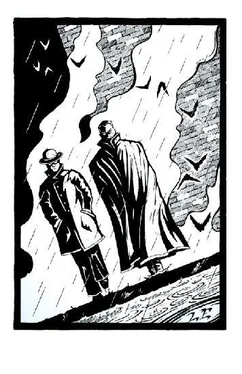“Nothing.” To avoid my friend’s silence on this matter as being altogether too strange I added, ‘I arrived from London in something of a rush.’
Captain Smeaton didn’t appear concerned by my ignorance and continued swiftly. “You’re on board the Fitzwilliam , a salvage vessel. Mr. Holmes spent the day with us yesterday, because … well … I’ll come to that later, sir. I’ll tell the story in plain-speak. There’s no requirement for me to embellish with colorful or dramatic phrases, because what you’ll witness is going to strike at the heart of you anyway.”
Holmes stood beside me, listening carefully.
The Captain did as he promised, rendering his account in deep, whispery tones that were plain and very much to the point. “Five years ago, Doctor Watson, we were engaged by the admiralty to recover silver bullion from the SS Runswick , which lies ninety fathoms beneath our keel. The depth is too great for divers using Siebe Gorman suits. They can operate to depths nearing thirty fathoms or so — to go any deeper is certain death. So we use Submarine Chambers, such as this.” He indicated the iron cylinder that occupied the deck. Moisture dripped from its massive flanks. Bulbous rivets held that hulking beast together in such a formidable way the thing appeared downright indestructible to my eyes.
“A diving bell?” I asked.
“As they are commonly known. Diving bells have been used since the time of the ancient Greeks, sir. Back then they’d simply invert a cauldron, trapping the air inside. This they’d submerge into the ocean. A diver would then visit the air pocket in order to breathe. That arrangement allowed sponge divers, and the like, much greater duration on the seabed.”
“Remarkable,” I commented, eying the huge vessel squatting there on the deck. “And this is the twentieth century descendent of the cauldron?”
“That it is, sir.” Captain Smeaton’s gaze strayed toward Holmes as if seeking permission to continue. Holmes gave a slight nod. “To get to the meat of the matter, sir, back in 1899 we used a diving bell to retrieve silver bullion from the sunken ship. One particular morning I ordered that the Pollux , which is the name of the bell, be lowered to the ocean floor. On board was a man by the name of George Barstow. The diving bell was delivered to the wreck by crane, as you see here, sir. It is both lowered, and raised to the surface by means of a steel hawser. Fresh air is pumped down to the craft via a tube. Contact is maintained between the ship and the diving bell by telephone. I tell you, gentlemen, I curse the hour that I ordered Barstow to man the craft. Not a day goes by without me reliving those terrible events.” He took a deep breath, his grey eyes glistened. “Initially, the dive went well. Barstow descended to the wreck without incident. His function was to act as observer and to send directions, via telephone apparatus, to my men on the ship to lower a grappling hook in order to retrieve the cargo. We successfully hooked five cases of silver and brought them to the surface. Then I noticed a swell had begun to run. This poses a risk to diving bells as it puts excessive strain on the hawser. I gave the order to winch the craft back to the surface.” He paused for moment. “That’s when Barstow spoke to me by telephone. He reported that the diving bell had become caught on the superstructure of the wreck. The thing had jammed fast. We tried every which way to free the bell. Meanwhile, waves had started to break against the sides of the ship. So I told the winch-man to use brute force and haul the diving bell free.” He paused again. Trying to avoid melodrama, he said simply. “The hawser snapped. As did the telephone line and air pipe. That was five years ago. The Pollux became George Barstow’s coffin. He’s been down there ever since.”
“And now you are trying to recover the Pollux and the man’s body?”
“Indeed we are, Doctor Watson.” He nodded to where a hawser ran along a steel channel to a fixing point on deck. Barnacles and brown kelp sheathed the hawser. “That’s from the Pollux. We recovered it three days ago.”
“It’s still attached to the diving bell?”
The captain nodded his grey head. “The Pollux is held down there on the seabed. Probably the old wreck’s doing. Even so, we made fast the cable on deck here. I’m going to do my damndest to haul that diving bell out of Davy Jones’s locker and bring the blasted thing back to dry land, so help me.” His hands shook as a powerful emotion took charge. “Or it’ll be the death of me in trying.”
I looked to Holmes for some explanation. After all, a salvage operation? Surely that’s a matter that doesn’t require the intervention of the world’s greatest consulting detective.
“Yesterday,” Holmes said, “The diving bell’s twin went in search of its sibling.”
I turned to the vessel that so much resembled the boiler of a locomotive. On the side of that great iron cylinder was painted, in white, the name Castor . “And did it find its twin?”
“It did. The diving bell returned without apparent incident. However, the crew of two were, on the opening of the hatch, found to be quite dead.”
“Quite dead!” thundered the Captain. “They died of fright. Just take one look at their faces!”
“What I require of my friend, Doctor Watson, is to examine the deceased. If you will kindly take us to the bodies.”
“Holmes?” I regarded him with surprise. “A post mortem?”
“The simple cause of death will be sufficient, Watson.”
“I can’t Holmes.”
“You must, and quickly.”
“Not unless I am authorised by the local constabulary, or the coroner.”
“You must tell me how they died, Watson.”
“Holmes, I protest. I shall be breaking the law.”
“Oh, but you must, Watson. Because I am to be—” he struck the side of the diving bell, “—this vessel’s next passenger!”
Before I could stutter a reply a sailor approached. “Captain! It’s started again! The sounds are coming up the line!” His eyes were round with fear. “And it’s trying to make words!”
That expression of dread on the man’s face communicated a thrill of fear to my very veins. ‘What’s happening, Holmes? What sounds?”
“We’re in receipt of another telephone call.” His deep-set eyes locked onto mine. “It hails from ninety fathoms down. And it’s coming from the Pollux !”
Upon passing through a door marked Control Room , we were greeted by a remarkable sight.
Three men in officer’s uniforms gathered before telephony apparatus on a table. Fixed to the wall, immediately in front of them, was a horn of the type that amplifies the music from a gramophone. Nearby, two young women stood with their arms round each other, like children frightened of a thunderstorm. Both were dressed in black muslin. Both had lustrous, dark eyes set into bone-white faces. And both faces were identical.
Twins. That much was evident.
The occupants of the room stared at the horn on the wall. Their eyes were open wide, their expressions radiated absolute horror. Faces quivered. They hardly dared breathe, lest a quick intake of breath would invite sudden, and brutal, destruction.
Holmes strode toward the gathering. “Are the sounds the same as before?”
An officer with a clipped red beard answered, but he couldn’t take his bulging eyes from the speaker horn. “They began the same … in the last few minutes; however, they’ve begun to change.”
A second officer added, “As if it’s trying to form words.”
The third cried, “Sir! What if it really is him? After all this time!”
“Keep your nerve, Jessup. Remember that ladies are present.” Captain Smeaton tilted his head in the direction of the two women. Then he said, “Doctor Watson. Allow me to introduce you to Mrs. Katrina Barstow, widow of George Barstow, and her sister, Miss Claudine Millwood.”
Читать дальше












